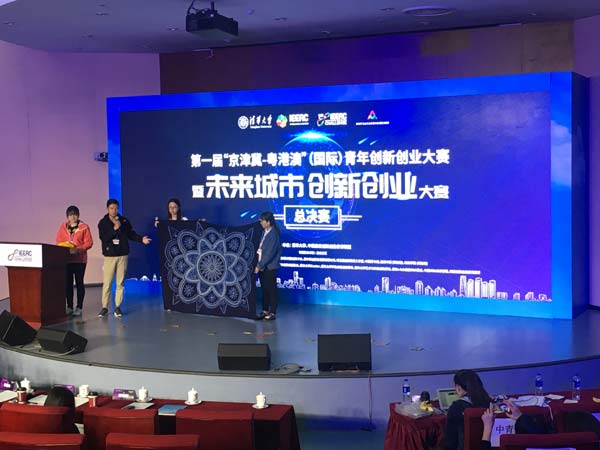The sons and daughters of invention
By Chen Meiling | China Daily | Updated: 2018-11-21 07:31

Given the challenge of coming up with innovative products or practices, thousands of young people went to work during a 7-month competition, ultimately producing a new flock of entrepreneurs, Chen Meiling reports.
There were a total of 1,707 teams, a figure whittled down to just 33 over seven months, before just four emerged triumphant. They won medals for coming up with the most promising innovative projects.
Over those seven months, young entrepreneurs throughout the country had dazzled judges of the first "Beijing-Tianjin-Hebei and Guangdong-Macao-Hong Kong" youth innovation and entrepreneurship competition with their ingenuity and innovative projects. These included eye patches said to ease depression and insomnia; DNA technology for identifying criminal-suspects; underwater robots that can gather sea cucumbers; and remotely controlled indoor gardens. The contest was held during the 2018 National Mass Innovation and Entrepreneurship Week.
The contest organizers, Tsinghua University and the Innovation and Entrepreneurship Education Alliance of China, held its final and the awards ceremony in Beijing last month.
Winning prizes is not the end of the story for the competitors. The next big test is to see if they can turn their projects into profitable business propositions.
Liu Xiaopeng of the Institute for Electronics and Information Technology in Tianjin, Tsinghua University, says he has been able to amass 20 million yuan ($3 million) in revenue since he set up Tianjin United AI Technology nine months ago.
The 24-year-old's invention is a device that monitors for sounds that can alert the likes of railway operators, airlines, ship owners and those with other large mechanical equipment to impending breakdowns.
The application and the moneymaking potential of Liu's invention becomes apparent when you consider just the savings in labor costs for railway operators, who need to get staff to physically check for abnormalities. Liu's invention deletes those expensive humans from the financial equation. It also reduces their propensity to make incorrect judgments based on such factors as weather, motions and experience.
His business partners include several air-conditioner manufacturers, an artificial-intelligence company and railway companies, Liu says.
"The aim of entrepreneurship is to solve three problems: human resources, funding and sales."
To enlist eight graduates from Tsinghua University to join his startup, Liu turned into a veritable kebab-consumption machine. Each time he met somebody he wanted to enlist, the chosen fare for socializing was kebabs.
"I must have eaten kebabs 100 times, given that each time I met somebody I had a dozen of them. After all, you have to become friends with these people (before they decide to become involved financially)."
























